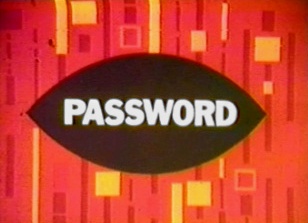 So after I've been ragging on game shows for two weeks in a row and I'm still saving the big one for later. I think I need to give myself a little credibility and balance, so let's talk about a great show that tried to come back a while ago: Password.
So after I've been ragging on game shows for two weeks in a row and I'm still saving the big one for later. I think I need to give myself a little credibility and balance, so let's talk about a great show that tried to come back a while ago: Password.Man, what a simple game. Two teams, each made of a contestant and a celebrity compete at a word conveyance game. One team member is given the word, the "password" if you will. and must give one-word clues and get the other member to guess the password. Failure to do so would result in the word getting passed over to the other team and they get a shot at it. Getting the password with the fewest clues got you more points and first to 25 wins $100. It was the 60's, that was a lot of money! Eventually it gets bumped to $250 for a win. This is then followed by one of the first Lightning rounds in Game Show history: sixty seconds, five passwords, $250. I'm telling you, this set up was brilliant, and if I needed any evidence, the show ran for over 1,000 episodes and won the first ever Daytime Emmy for Outstanding game show.
It's first revival, Password Plus, was almost identical. It brought the same host back and everything. It did add the Password Puzzle, where every password given during a round's duration was in itself a clue to another password. Figure that out and it's big points and big money. the second revival, Super Password, was almost identical to that, but added the Cashword, a quick little side-game for extra money for a very difficult password.
But what I really want to talk about is Million Dollar Password. Man, this show was a great prime time revival for this show. Format-wise it's more like $50,000 Pyramid. Two teams make a go at rapid passwords. They take turns with celebrities and take turns as the giver and receiver of clues. The person with the most points gets a go with the celebrity with whom they earned the most points at the Million Dollar Password. Shift to format of Who Wants to Be a Millionaire? where the team is given a set list of words, decreasing in number every time; get five passwords to finish the round and earn raising increments of money. Considering it was hosted by Regis Philbin, it never felt weird. The other thing about Philbin and why he's a great game show host is his concentrated energy. He's got a lot, but he's not wild; he's very focused and it helps convey how genuinely excited he is to host a show that could win you $1,000,000. I mean, this guy hosted Millionaire; he knows how to make a show which was 90% people thinking into prime time t.v., a show about fast-paced thinking and teamwork should be no problem!
I know I complained about Lingo's new open stage, but Million Dollar Password doesn't really have this problem since distance from the playing board is overshadowed by the the relationship with the teams. No matter how much playing space you're given, this game requires focus and concentration on what your partner is trying to convey, which you can only do if you keep close quarters.
So why did this show not last? It was great, right? Well, a few things brought it down. Some of the celebrities weren't exactly shining lights of intellect. Phil Keoghan, host of The Amazing Race, being the first example that comes to my mind blew it for a contestant being too nervous to stop, think, and use all three clues he'd been given to figure out his password and jumped on a word that only really fit the third clue. (Although, sometimes it was inverted. It was a good laugh when a contestant paired with Craig Ferguson was given Dallas as a clue and gave "Texas" and Capital" as clues. Ferguson freaked for a second but correctly called "Austin.") Other celebrities, and definitely some contestants didn't really know how to use inflection to convey synonym vs opposite. It was a shame, but we can't all be Betty White, right? (Although, even though I can totally hate her as a person, Rosie O'Donnell was a wizard at game shows in her own right. Frankly, if I were on the show I'd want to be paired with her.) And, I dunno, I guess nobody watched it. That's the big thing for prime time shows, especially if we're putting this much money into it, we've gotta draw in the viewers.
Oh well. I liked it. I wish it were back. I wish there were more. But that's not gonna happen. Woe is me. I've never been good at concluding paragraphs.

No comments:
Post a Comment